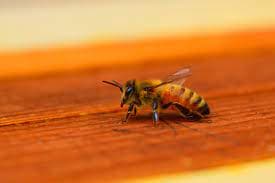Bees can help boost food security of two billion small farmers at no cost – UN
The United Nations Food and Agriculture Organization (FAO) today highlighted the publication of a new study that quantifies, for the first time, how much crop yields depend on the work of bees that unknowingly fertilize plants as they move from flower to flower.
In doing so, the agency says bees may have a key role to play in improving the production of some two billion smallholder farmers worldwide and ensuring the food security and nutrition of the world’s growing population.
“What do cucumbers, mustard, almonds and alfalfa have in common?” asked FAO in a press release. “On the surface, very little; but there is one thing they share: they all owe their existence to the service of bees.”
The agency notes that for centuries, this tiny striped helper has labored the world’s fields without winning much recognition for its many contributions to food production. Wild bees, in particular, seemed doomed to slog in the shadow of their more popular cousin – the honeybee – whose day job of producing golden nectar has been far more visible and celebrated.
But FAO says bees of all stripes are finally getting their moment in the sun. The paper, published in the magazine Science, makes the case that ecological intensification – or boosting farm outputs by tapping the power of natural processes – is one of the sustainable pathways toward greater food supplies.
Food security strategies worldwide could therefore benefit from including pollination as integral component, experts say.
“Our research shows that improving pollinator density and diversity – in other words, making sure that more and more different types of bees and insects are coming to your plants – has direct impact on crop yields,” said Barbara Gemmill-Herren, one of the FAO authors of the report.
“And that’s good for the environment and for food security,” she stressed, adding that it is beneficial to actively preserve and build habitats in and around farms for bees, birds and insects to live year-round.
Focus on developing countries
In the field study coordinated by FAO, scientists compared 344 plots across Africa, Asia and Latin America and concluded that crop yields were significantly lower in farming plots that attracted fewer bees during the main flowering season than in those plots that received more visits.
When comparing high-performing and low-performing farms of less than two hectares, the outcomes suggest that poorly performing farms could increase their yields by a median of 24 per cent by attracting more pollinators to their land.
The research also looked at larger plots and concluded that, while those fields also benefited from more pollinator visits, the impact on yields was less significant than in the smaller plots – probably because many bees have a harder time servicing large fields, far from their nesting habitat. But a diversity of bees, each with different flight capacities, can make the difference.
This suggests that bee diversity offers benefits both for small-holder farmers in developing countries, and for larger farms.
Why it matters
The research comes at a time when wild bees are threatened by a multitude of factors and managed bee populations can’t keep up with the increasing number of plots that grow pollination-dependent crops.
Climate change poses yet another problem: “Bees will struggle with the higher temperatures,” explained Nadine Azzu, Global Project Coordinator in FAO’s Plant Production and Protection Division, who also worked on the report. “Plus, flowers in some parts of the world are now opening at different times than they used to, and the bees are not there to pollinate,” she said.
This means finding ways to keep pollinators buzzing around the farm year-round is becoming even more important.
Previously unstudied
Pollinators – such as bees, birds and various types of insects that fly, hop or crawl from one flower to another – have for centuries been the invisible helpers of farmers worldwide.
Different types of bees have distinct tastes and roles to play in the food system. Bumble bees, for example, are one of the few types of bees that can successfully pollinate tomatoes, which heavily rely on buzz pollination to bear fruit
Honey bees, in turn, are important because they are the least picky in their choice of flowers- and there are many of them, in each hive, even though their more discerning wild bee cousins are more effective in fertilizing the plants they’re attracted to.
The study shows that for smallholdings, crop yield increased linearly with increased visits to the flowers that were being tracked. Pollination was the agricultural input that contributed the greatest to yields, beyond other management practices.
This holds promise for one of the major agricultural challenges of our time: How to help smallholders produce more without hurting the environment.
How to attract bees
The report also found that attracting pollinators to farms is not as easy as planting for the season and waiting for them to arrive.
Maintaining habitat and forage resources all year long is key to wooing pollinators and keeping them on the land for longer periods of time. This can be done by planting different trees and plants that flower at different times in the year, for example. Read more – Bees can boost food security of two billion small farmers (Courtesy: United Nations News Centre)



